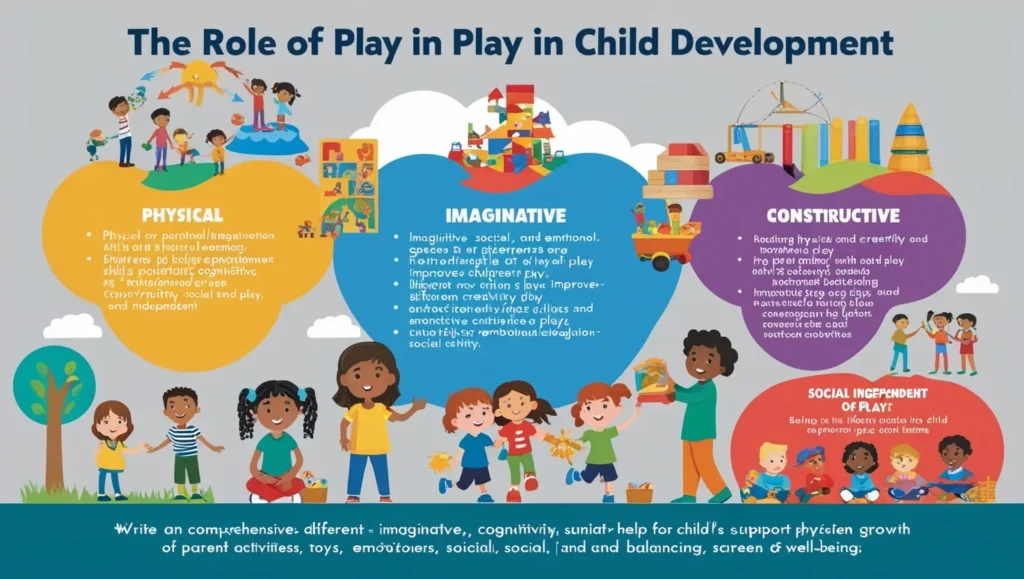The Role of Play in Child Development
Play is often seen as mere entertainment for children, but it is much more than that. It is a crucial aspect of childhood that significantly contributes to a child’s physical, emotional, social, and cognitive development. Through play, children explore the world around them, learn essential life skills, and build the foundation for future learning and relationships. Let’s dive deep into the role of play in child development and understand why it’s a fundamental part of growing up.
Why Is Play Important?
Play is the natural language of childhood. It is how children make sense of the world, express themselves, and interact with others. Research shows that play enhances brain development and lays the groundwork for critical skills like problem-solving, creativity, and emotional regulation. Whether structured or free-form, play allows children to develop holistically in a supportive and enjoyable environment.
The Types of Play and Their Impact
1. Physical Play
Activities like running, climbing, or playing tag fall into this category. Physical play:
- Enhances gross and fine motor skills.
- Promotes physical health by improving strength, coordination, and stamina.
- Helps children understand spatial awareness and risk assessment.
2. Pretend or Imaginative Play
Role-playing as a doctor, chef, or superhero is part of pretend play. It:
- Boosts creativity and imagination.
- Encourages problem-solving and critical thinking.
- Helps children understand and practice social roles and norms.
3. Constructive Play
Building blocks, puzzles, and crafting activities:
- Develop fine motor skills and hand-eye coordination.
- Encourage goal-setting and persistence.
- Foster logical thinking and spatial reasoning.
4. Social Play
Playing with peers, such as in group games or team sports:
- Improves communication skills and teaches collaboration.
- Enhances empathy and emotional intelligence.
- Builds a sense of community and teamwork.
5. Independent Play
Quiet time spent alone with toys or books:
- Encourages self-reliance and independence.
- Allows children to explore their own interests and passions.
- Provides an opportunity for reflection and self-regulation.
The Developmental Benefits of Play
1. Cognitive Development
Play stimulates the brain by fostering curiosity and creativity. Activities like puzzles, games, and problem-solving tasks enhance:
- Memory and concentration.
- Critical thinking and decision-making.
- Language and mathematical skills through play-based learning.
2. Emotional Development
Through play, children learn to express and regulate their emotions. It helps them:
- Develop resilience by overcoming challenges during play.
- Build self-confidence through mastery of new skills.
- Manage stress and anxiety through joyful and engaging activities.
3. Social Development
Interacting with peers during play teaches children important social skills such as:
- Sharing and taking turns.
- Conflict resolution and negotiation.
- Understanding different perspectives and building friendships.
4. Physical Development
Active play supports healthy growth and physical fitness. It:
- Strengthens muscles and bones.
- Improves coordination and balance.
- Reduces the risk of childhood obesity and related health issues.
How Parents and Educators Can Support Play
- Provide Time and Space Ensure children have plenty of time and safe spaces to play. Balance structured activities with free play to allow for creativity and spontaneity.
- Choose Developmentally Appropriate Toys Select toys and materials that encourage exploration, creativity, and skill-building. Open-ended toys like blocks, art supplies, and dress-up clothes are ideal.
- Encourage Outdoor Play Nature offers endless opportunities for exploration and learning. Outdoor play improves physical health and fosters a connection with the environment.
- Limit Screen Time While digital play can have educational benefits, excessive screen time can hinder social and physical development. Encourage hands-on, active play instead.
- Participate in Play Engage in play with children to strengthen bonds and model positive behaviors. Whether it’s a board game or a trip to the park, your involvement adds value to the experience.
The Role of Play in Modern Challenges
In today’s fast-paced world, children often face packed schedules and increased screen time, which can limit opportunities for play. Reintroducing play into daily routines is essential for counteracting these challenges. Schools are also recognizing the importance of play-based learning to make education more engaging and effective.
Final Thoughts
Play is not just a leisure activity for children—it is an essential part of their development. By engaging in play, children learn critical skills, foster relationships, and build a strong foundation for future success. As parents, educators, and caregivers, it is our responsibility to encourage and prioritize play in children’s lives. After all, play is the work of childhood, and its benefits last a lifetime.

